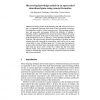Free Online Productivity Tools
i2Speak
i2Symbol
i2OCR
iTex2Img
iWeb2Print
iWeb2Shot
i2Type
iPdf2Split
iPdf2Merge
i2Bopomofo
i2Arabic
i2Style
i2Image
i2PDF
iLatex2Rtf
Sci2ools
AIED
2015
Springer
2015
Springer
Discovering Knowledge Models in an Open-ended Educational Game using Concept Formation
Developing models of the knowledge and skills being exercised in a task is an important component of the design of any instructional environment. Developing these models is a labor intensive process. When working in exploratory and open-ended environments (EOLEs) the difficulty of building a knowledge model is amplified by the amount of freedom afforded to learners within the environment. In this paper we demonstrate a way of accelerating the model development process by applying a concept formation algorithm called TRESTLE. This approach takes structural representations of problem states and integrates them into a hierarchical categorization, which can be used to assign concept labels to states at different grain sizes. We show that when applied to an open-ended educational game, knowledge models developed from concept labels using this process show a better fit to student data than basic handauthored models. This work demonstrates that it is possible to use machine learning to automa...
Related Content
| Added | 14 Apr 2016 |
| Updated | 14 Apr 2016 |
| Type | Journal |
| Year | 2015 |
| Where | AIED |
| Authors | Erik Harpstead, Christopher J. MacLellan, Vincent Aleven |
Comments (0)

